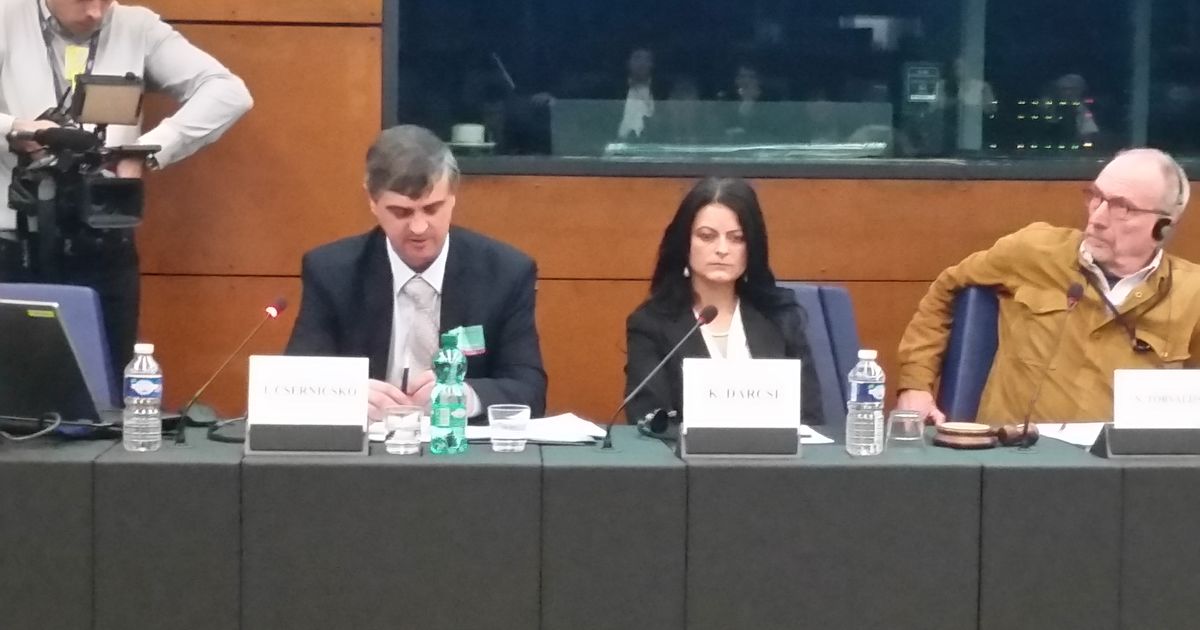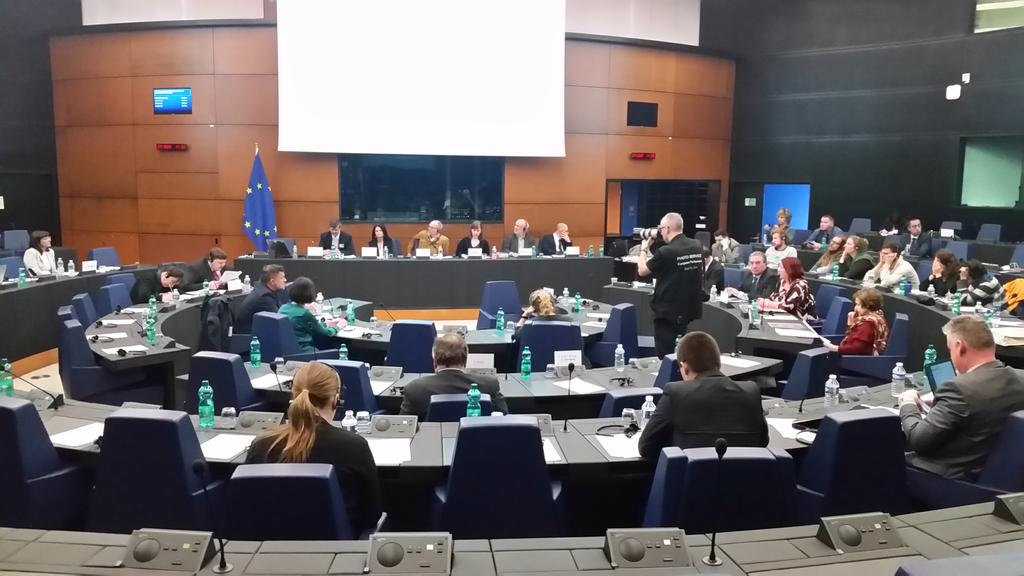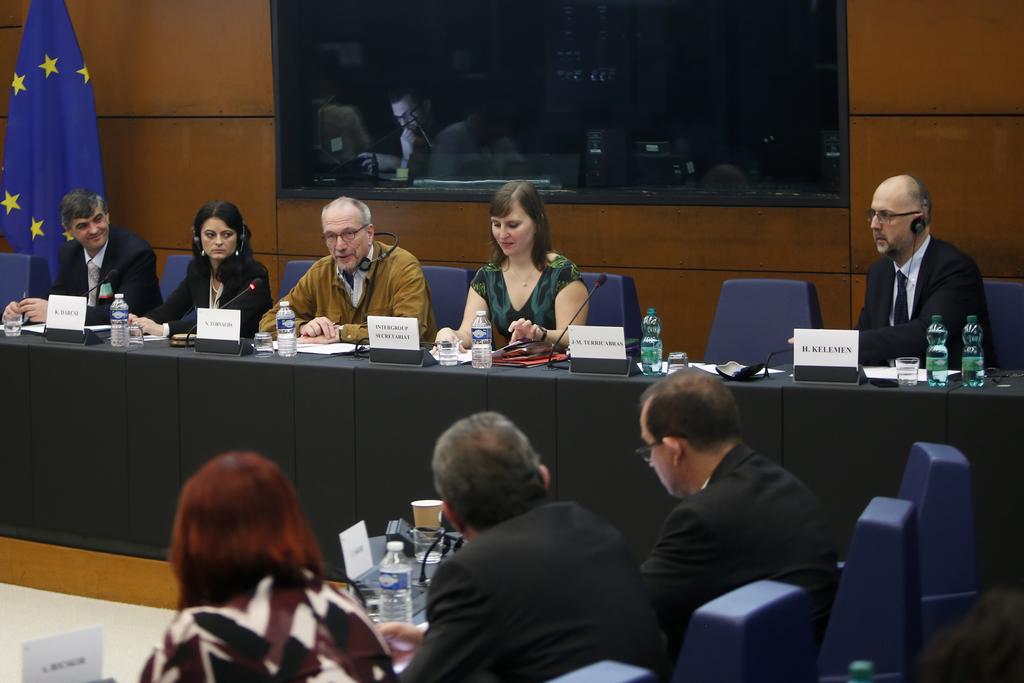
FUEN supports its member organisation KMKSZ from Ukraine
25.11.2016FUEN’s member organisation KMKSZ, the Cultural Union of Hungarians in Transcarpathia, recently informed the FUEN about recent developments in the field of minority rights in Ukraine that will not only affect the Hungarian community, but all the national minorities living in the country. The current status of linguistic and educational rights in the Ukraine was presented in Strasbourg on Thursday at the latest meeting of the Minority Intergroup in the European Parliament, which was attended also by FUEN President Loránt Vincze.
According to KMKSZ President László Brenzovics, who is a member of the Ukrainian Parliament, there is an attempt to change the law on education in a restrictive manner that would badly affect minorities. If the amendment were to be adopted by the Parliament of Ukraine, the right to minority education, currently applicable on all levels and for all citizens belonging to autochthonous minorities, would be limited to pre-school and high school level. Moreover, only those who live in compact minority communities may enjoy this right and parallel teaching in the Ukrainian language may be compulsory.
Secondly, the law currently guarantees the right to full education in the mother tongue for all minorities, while the amendment would limit this right to only the languages, which are official in the European Union, thus leaving minorities with no EU-member kin-states outside the application of the law. The new law would only grant them the possibility of learning their mother tongue as a separate subject. The FUEN considers it as another potential source of inequality and therefore it find this change unacceptable.
The KMKSZ expressed their concern about the general effects such an amendment might have, recalling the case of Russian military intervention in the Crimea, which was basically argued on grounds of national security and on the protection of the Russian minority, at the time that the law on language rights was about to be abolished.
The current legislation guarantees the use of the mother tongue in the local public administration in those places where a minority reaches the 10% threshold. After several attempts to abolish it, the language law now is facing a new challenge before the Constitutional Court of Ukraine. The situation is particularly dangerous, because if the Court declares the law anti-constitutional, language rights will simply disappear and ethnic tensions will certainly increase once again in Ukraine.
The FUEN assures the KMKSZ its full solidarity and support for the minorities in Ukraine and therefore urges the Ukrainian authorities to refrain from any attempt to limit the use of minority rights and guarantee full application of internal and international commitments. “It is unacceptable that the new legislative amendments are aimed at limiting the minority rights on language use and education in Ukraine. This is against the international commitments of the Government in Kiev. We call on Ukraine to start a dialogue with the minorities and adopt instead a minority law, which would ensure the rights of the numerous ethnic minorities in Ukraine and which would certainly contribute to inter-ethnic peace. I believe that peace and stability is what all people of the Ukraine wish for the most right now. A good inter-ethnic climate would certainly contribute to achieve this.” – said FUEN President Vincze, calling on the European Union and the Council of Europe to closely monitor Ukraine and remind the country’s government about its commitments regarding the application of the minority protection standards of the Council of Europe.
The KMKSZ, led by MP László Brenzovics, is the main political body of the Hungarians living in Transcarpathia, the border region of Ukraine with Hungary and Slovakia. Therefore it published, in collaboration with Hungarian researchers and other non-governmental organizations[1], their alternative report on the Ukrainian Government’s Third Periodic Report on the implementation of the European Charter for Regional or Minority Languages, that was submitted to the Council of Europe in September 2015. The alternative report focuses on issues of implementation of the Charter in Transcarpathia, and aims to complement the government’s periodic report by shedding light from the perspective of the users of regional and minority languages and pointing out some problematic issues, which still remain unsolved despite the ratification of the Charter. The document is available here:
[1] The report was prepared with the cooperation of members of the Transcarpathian Hungarian Cultural Association, the Transcarpathian Association of Hungarian Pedagogues, the Democratic Alliance of Hungarians in Ukraine, the A. Hodinka Linguistic Research Centre, and the T. Lehoczky Research Centre.


Пресс релизы
- New secretariat in the Polish parliament supports national and ethnic minorities
- FUEN calls for the inclusion of the Ladin language at the 2026 Winter Olympic Games
- FUEN Urges UN Special Rapporteur to Advocate for a Coherent EU Minority Protection Framework
- FUEN wishes you a peaceful Christmas season, restful days and a bright, hopeful start to the new year!
- FUEN calls on the EU to act over systematic ethnic-based land confiscations in Slovakia
- Women of Minorities conference in Budapest calls for structural change to ensure equal political participation of minority women
- FUEN President Olivia Schubert at UN Forum on Minority Issues in Geneva
- "Laboratory of Peace": 28th Seminar of Slavic Minorities held in European Capital of Culture Gorica/Gorizia
- Equality in Political Participation and Representation: Third “Women of Minorities” Conference to Be Held in Budapest
- FUEN Working Group on Education discusses challenges and future of minority schooling in Europe














